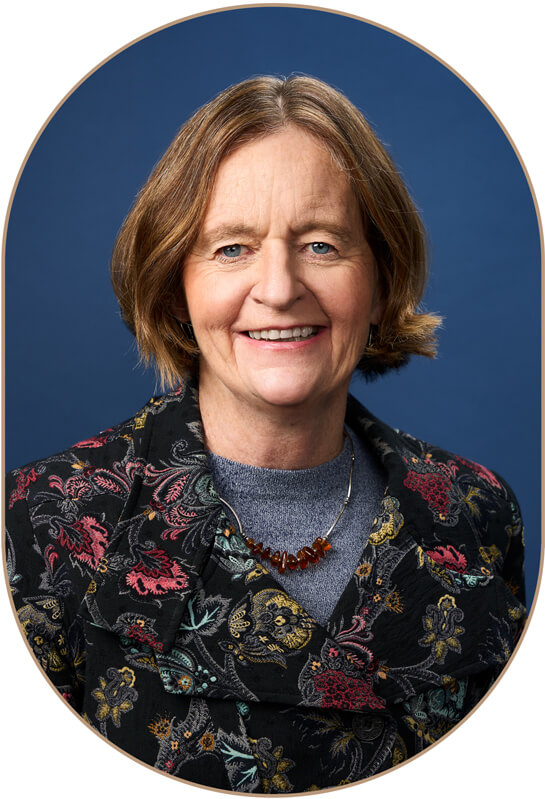Alison Douglass
BARRISTER
Deputy Chair, Health Practitioners Disciplinary Tribunal/Te Rōpū Whakatika Kaimahi Hauora
Honorary Senior Lecturer, Bioethics Centre, University of Otago
Tēnā koutou katoa
Having joined the Independent Bar in 2008, Alison has been a practising litigation lawyer for 38 years, specialising in health and disability law. Alison’s knowledge of the law and areas of speciality in health and disability law, and ethics and policy, has been recognised through her appointment on statutory authorities and ethics committees. Since 2018, Alison has held the part-time appointment as a Deputy Chair of the Health Practitioners Disciplinary Tribunal (HPDT) / Te Rōpū Whakatika Kaimahi Hauora.
Alison practised out of Wellington for 20 years. She has a broad background in civil and criminal, family and employment law. Alison was a partner, then consultant to Tripe Matthews and Feist, a Wellington law firm, while raising their three children with her husband Peter.
In 2011 she moved with her family to Ōtepoti / Dunedin and since 2012 she has been a member of Barristers Chambers with Dr Royden Sommerville KC (and the late Len Andsersen KC). www.barristerschambers.co.nz. Alison continues to be based out of Dunedin and she has developed her practice with a national reach for clients from around New Zealand.
She has been appointed as amicus curiae in the Court of Appeal, and most recently appeared as counsel in an employment law appeal in the Supreme Court regarding the legal test for setting aside a settlement agreement on the grounds of incapacity and the application of the Convention on the Rights of Persons with Disabilities.
Alison is counsel in estate and trust litigation matters in the High Court and has appeared in inquisitorial proceedings, including before the Coroner’s Court and Human Rights Review Tribunal. She has extensive medico-legal experience in the ACC jurisdiction.
Alison regularly appears in the Family Court and the appellate courts as lawyer for people with impaired capacity. In 2014 Alison was awarded the prestigious New Zealand Law Foundation International Research Fellowship. She has published a law reform report on mental capacity law, and with a psychiatrist and an ethicist, a book and a professional guidance (the Toolkit) for lawyers and doctors on assessing capacity: www.alisondouglass.co.nz
Throughout her career Alison has been mentored by, and been a mentor for, women. She supports the values of KSC by providing an environment for women practitioners and people from diverse backgrounds and cultures to flourish in the legal profession. Ngā mihi nui ki a koutou.
Qualifications
LLB, University of Canterbury,1985
Admitted as Barrister and Solicitor of the High Court of New Zealand, 1985
MBHL (Master of Bioethics and Health Law), University of Otago, 1999
New Zealand Diploma in Te Reo (Rumaki) (Level 5), Te Wānanga of Aotearoa, 2021
Current appointments
- Deputy Chair, Health Practitioners Disciplinary Tribunal (HPDT) / Te Rōpū Whakatika Kaimahi Hauora 2018 – The HPDT hears and determines disciplinary proceedings brought against registered health practitioners from 24 health professions under the Health Practitioners Competence Assurance Act 2003. www.hpdt.org.nz
- Lawyer on panel for the subject person under the Protection of Personal and Property Rights Act 1988 (PPPR Act), the care recipient under the Intellectual Disability (Compulsory Care and Rehabilitation) Act 2003 (IDCCR Act), and counsel to assist in the Family Court and appellate courts, 1990s –
- Honorary Senior Lecturer, Bioethics Centre, University of Otago, 2014
www.otago.ac.nz/bioethics/people/academic/profile?id=1664 - ACC External Medico-Legal Panel (with a consultant surgeon) for the reassessment of surgical mesh claims, 2021
www.nzdoctor.co.nz/article/independent-experts-follow-acc-it-reassesses-declined-mesh-injury-claims-1 - Expert committee to Ngā Huarahi Whakatau / Review of Adult Decision-Making Capacity Law Te Aka Matua o te Ture / Law Commission, 2022. huarahi-whakatau.lawcom.govt.nz
- Approved lead provider of legal aid (civil, family, mental health and Supreme Court), Ministry of Justice (# 15772), 1990s –
Past appointments
- Lawyer providing legal assistance to the Abuse in Care – Royal Commission Inquiry, 2023
- Chair, Advisory Committee of Assisted Reproductive Technology (ACART), 2011 – June 2017. ACART advises the Minister of Health and issues guidelines on all aspects of assisted reproductive technologies under the regulatory framework of the Human Assisted Reproductive Technology Act 2004
- Convenor, Health Law Committee, New Zealand Law Society, 2005 – 2016
- ACC member, Medical Misadventure Advisory Committee (1990s); Co-Chair, ACC Research Ethics Committee, 2004 – 2014
- Chair, Wellington Ethics Committee, 1993 – 1997
Awards and memberships
Recipient of Michael and Suzanne Borrin Foundation research and writing grant 2024, supporting a sabbatical in Edinburgh, Scotland, updating the Toolkit for Assessing Capacity
Recipient of New Zealand Law Foundation International Research Fellowship 2014, for a legal research project in the United Kingdom and New Zealand.
Member, New Zealand Bar Association / Ngā Ahorangi Motuhake o te Ture
Member, Family Law Section, New Zealand Law Society
Member, Executive Committee, Coalition of Australasian Tribunals (COAT) Aotearoa 2023 –
Member, Otago Women’s Law Society (OWLS) 2012 – (past Committee member)
Member, International Association of Women Judges (IWAJ) 2021 –
Past member, Wellington Women Lawyers’ Association and Wellington Medico Legal Society
Notable cases & publications
Alison has appeared in a wide range of substantive and appeal proceedings as lead/co-counsel in a range of notable cases. A full list of cases and publications, including articles in peer-reviewed journals is available on request.
Cases
TUV v The Chief of New Zealand Defence Force [2022] NZSC 69 – an employment law appeal to the Court of Appeal and then to the Supreme Court regarding the legal test for setting aside a settlement agreement on the grounds of incapacity and the application of the Convention on the Rights of Persons with Disabilities.
Chief Executive of Oranga Tamariki v N T W [2020] NZFC 6383 (unrep), Judge E Smith – Lawyer to assist the Dunedin Family Court in a contested hearing on the preliminary issue of whether the litigant mother who had her children removed under the Oranga Tamariki Act 1989 required the appointment of litigation guardian.
McKerracher v The Chief Executive of the Ministry of Social Development [2020] NZSSAA 3 (unrep) – Counsel for the appellant in an appeal to the Social Security Appeal Authority successfully challenging the respondent’s decision that the appellant was not financially eligible for the Residential Care Subsidy pursuant to s 45 of the Residential Care and Disability Support Services Act 2018.
Public Trust v Dollimore & Ors [2018] NZHC 3316, Simon France J, (substantive judgment) and Public Trust v Dollimore [2019] NZHC 607, [2019] 2 NZLR 901 (costs judgment) – Counsel for the second defendant, beneficiary successfully upheld the last will of the testatrix and finding that the testatrix did not lack testamentary capacity and the allegation of undue influence against my client niece was dismissed. In the cost’s judgment, my client was awarded full indemnity costs against the estate and as the executor was found not to have adopted an impartial approach, its costs were reduced by one-third of its actual costs.
Te Korowai-Whariki v PJW [2017] NZFC 4800, Judge Turner; [2019] NZFC 4632, Judge Smith – These hearings involve testing the specialist assessor’s psychiatric evidence on the need for the care recipient to remain under compulsory care and the liberty interests of people with intellectual disabilities that commit criminal offences and are detained under the Intellectual Disability (Compulsory Care and Rehabilitation) Act 2003 (IDCCR Act).
RIDCA Central v VM [2011] NZCA 659 – counsel to assist before the Full Court of Appeal in the leading case under s 85 of the IDCCR Act regarding the criteria for extending compulsory care orders.
E v E, HC Wellington CIV-2009-485-2335, 20 November 2009, Simon France J (habeas corpus action); CCS Disability Action (Wellington) v JCE [2011] NZFLR 696, (FC), Judge Grace; JMG v CCS Disability Action (Wellington) [2012] NZFLR 369 (HC) Miller J (and an application for leave to appeal Ronald Young J, 27 May 2011) – Successfully represented the mother and welfare guardian of a young man with learning disabilities under the Protection of Personal and Property Rights Act.
Walsh v Pharmac [2010] NZAR 101 – counsel for the eight women plaintiffs, assisting Helen Cull QC, in an interim and substantive judicial review application regarding Pharmac’s decision to decline to fund Herceptin, an expensive breast cancer drug. The application was successful on the ground that Pharmac failed to consult properly on its proposed provision of a shorter-term provision of the cancer drug (compared to a 12-month regime of Herceptin as was common overseas). This case was the first time that a patient group (rather than a drug company) had brought a legal action against Pharmac to review its health funding policy decision. The Government subsequently funded the drug and it led to Pharmac reviewing its processes for funding high-cost medicines, including, its exceptional circumstances criteria.
Attorney-General v N [2002] 1 NZLR 651 – Employment Court and Court of Appeal. Counsel for the plaintiff in successful damages claim for N’s constructive dismissal following a sexual harassment complaint from her civilian employment in the New Zealand Army. Judge Shaw awarded N $40,000 general damages, at that time the highest amount of damages awarded for sexual harassment, subsequently reduced on appeal to $25,000.
Publications and reports
Douglass, A., Young, G., & McMillan, J. (2020). Assessment of mental capacity: A New Zealand Guide for Doctors and Lawyers. Wellington, New Zealand: Victoria University of Wellington Press, 607p.
Douglass, A. The Capacity Toolkit, CLE New Zealand Law Society Mental Capacity Readings (collated book), Auckland (June 2019).
Douglass, A. (2019). Best interests: A standard for decision-making. In I. Reuvecamp & J. Dawson (Eds.), Mental Capacity Law in New Zealand. (pp. 63-77). Wellington, New Zealand: Thomson Reuters.
Snelling, J., & Douglass, A. (2019). Legal capacity and supported decision-making. In I. Reuvecamp & J. Dawson (Eds.), Mental Capacity Law in New Zealand. (pp. 163-177). Wellington, New Zealand: Thomson Reuters.
Douglass, A., & Legge, M. (2019). Regulating, surrogacy in New Zealand: Evolving policy and cautious liberalism under the HART Act. In A. Masselot & R. Powell (Eds.), Perspectives on commercial surrogacy in New Zealand: Ethics, law, policy and rights. (pp. 1-24). Christchurch, New Zealand: Centre for Commercial & Corporate Law, University of Canterbury.
Douglass, A (2018) Filling the gap – Liberty safeguards for people with impaired capacity, Chapter 7 in This is not my Home. A collection of perspectives on the provision of aged residential care without consent. J Anderson-Bidios and M Fisher (Eds) New Zealand Human Rights Commission.
Douglass, A. (2017 and 2021). Mental capacity. In K. A. Morris (Ed.), Cole’s Medical Practice in New Zealand. (14th ed.). Wellington, New Zealand: Medical Council of New Zealand,
A Douglass Mental Capacity: Updating New Zealand’s Law and Practice (Report for the New Zealand Law Foundation, Dunedin, July 2016 (www.lawfoundation.org.nz/ and www.alisondouglass.co.nz)
Douglass, A. (2006) Report on the Regulatory Framework Governing Assisted Reproductive Technologies in New Zealand, Ministry of Health, August 2006.



